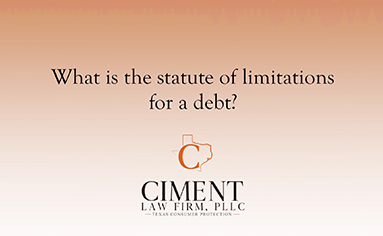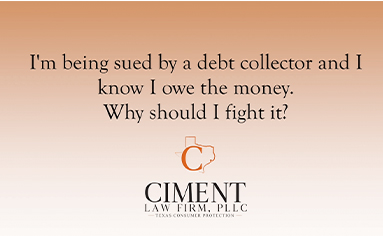We're here to help you.
833-779-9993

Which Bankruptcy Option Is Right For You?
The first step in the process of filing for bankruptcy is determining which chapter is best to file for your situation.
Chapter 7 Bankruptcy
Chapter 7 bankruptcy is a total liquidation bankruptcy that wipes out most of your general unsecured debts such as credit cards and medical bills without the need to pay anything back. You must qualify for Chapter 7 bankruptcy by meeting certain income requirements. If you make too much money, you’ll have to file under Chapter 13 bankruptcy instead. The amount of debt you have is not a factor in whether or not you qualify for Chapter 7 bankruptcy.
A bankruptcy trustee is appointed to administer your case. The Chapter 7 trustee will review your bankruptcy papers and supporting documents to make sure that everything is in order. The Chapter 7 trustee will also seize and sell your nonexempt property (property that you can’t protect with a bankruptcy exemption) to pay back your creditors. If you don’t have any nonexempt assets for the Chapter 7 trustee to take, then your creditors receive nothing.
Due to Texas’ generous exemptions, Chapter 7 bankruptcy works well for most Texans. In fact, most Texans that file Chapter 7 bankruptcy don’t lose any of their assets.
Advantages To A Chapter 7 Bankruptcy
- You receive a completely fresh start. After the bankruptcy is discharged the only debts you owe will be for secured assets on which you choose to sign a “Reaffirmation Agreement.”
- You have immediate protection against creditors’ collection efforts and wage garnishment on the date of filing.
- Wages you earn and the property you acquire (except for inheritances) after the bankruptcy filing date are yours, not the creditors or bankruptcy court.
- There is no minimum amount of debt required.
- Your case is often over and completely discharged in about 3-6 months.
Disadvantages To A Chapter 7 Bankruptcy
- You lose your non-exempt property which is sold by the trustee. If you want to keep a secured asset, such as a car or home, and it is not completely covered by your Texas bankruptcy exemptions then Chapter 7 is not an option.
- If facing foreclosure on your home, the automatic stay created by your Chapter 7 filing only serves as a temporary defense against foreclosure.
- Co-signers of a loan can be stuck with your debt unless they also file for bankruptcy protection.
- If you filed a prior case and received a discharge of your debts, you can only file a second Chapter 7 bankruptcy case eight years after you filed the first case.
Chapter 13 Bankruptcy
Chapter 13 bankruptcy is a reorganization bankruptcy designed for debtors with higher incomes who have enough money left over each month to pay back at least a portion of their debts through a modified repayment plan. Even though most Chapter 13 filers make too much money to qualify for Chapter 7 bankruptcy, some debtors choose to file for Chapter 13 bankruptcy because it offers some debtor benefits that are not available in a Chapter 7 filing. Some benefits include the ability to catch up on missed mortgage or car payments, wipe out wholly unsecured junior liens from your house or if you owe more on your car than it’s worth, you may be able to just pay off the value of your car and not the whole balance owed. Additionally, in a Chapter 13 bankruptcy, you can keep all of your property, including nonexempt assets, although you’ll have to pay unsecured creditors an amount equal to the value of your nonexempt property.
In a Chapter 13 bankruptcy, you pay back all or a portion of your debts through a repayment plan. The amount you must pay back will depend on your income, expenses, and type of debt you have.
Typically, Chapter 13 bankruptcy is for debtors who:
- don’t qualify for Chapter 7 but need debt relief (for instance, to lower credit card payments, stop litigation, or prevent a wage garnishment)
- have nondischargeable debts such as alimony or child support arrears that they’d like to pay off over three to five years, or
- have fallen behind on a house or car payment and want to get caught up on missed payments and keep the property.
Chapter 13 Requirements
When filing a Chapter 13 bankruptcy, you must also propose a repayment plan, typically referred to as a Chapter 13 plan. The Chapter 13 plan takes into account how much money you have leftover after reasonable monthly expenses have been paid to put toward your outstanding bills. The Chapter 13 plan will also show how this money will be divvied up amongst your creditors. Priority claims, such as taxes and back child support, must be paid in full; unsecured debts, such as credit card debt and medical bills, are usually paid as only a portion of what is owed. Depending upon your income and expenses, your secured and priority creditors, and whether or not you have any nonexempt assets, unsecured creditors can be paid off for as little as 0 cents on the dollar. The length of your Chapter 13 plan will extend between three and five years. Three years is the minimum length and five years is the maximum length the law allows for debts to be repaid. If your income is below the median income then you are only required to propose a three year Chapter 13 plan, but you may go up to five years. But, if your income is over the median income then you are required to propose a five-year plan. In addition to the general requirements listed above, the repayment plan must pass each of the following three tests: 1) It must be delivered in good faith; 2) Unsecured creditors must be paid at least as much as if a Chapter 7 bankruptcy had been filed — generally, this is the value of all the nonexempt property you own (see Texas Bankruptcy Exemptions); 3) All disposable income must be paid into the plan for at least three years.
In a Chapter 13 bankruptcy, you must begin making your plan payments within 30 days of the date we file your bankruptcy case with the Court. If you are employed and receive a paycheck from your employer you are required to submit a wage order. A wage order is an order to your employer to withhold your Chapter 13 plan payment from your paycheck and to submit that amount directly to the trustee. If you are not an employee that receives a paycheck, for example, if you are self-employed or retired, then you are required to submit an ACH authorization to the Chapter 13 trustee so that they can draft the Chapter 13 plan payment from your bank account automatically. If you have mortgage arrears when you file your Chapter 13 case, then your regular ongoing mortgage payments will be included in your Chapter 13 plan.
Chapter 13 Plan Confirmation
You may need to attend a hearing before a bankruptcy judge who will either confirm or deny the repayment plan. If everything is in order and none of your creditors or the bankruptcy trustee object to your Chapter 13 plan, then you will not have to attend the hearing in person. But, if there are any objections you will have to attend the bankruptcy hearing. Once your plan is confirmed and you make all the payments called for under your Chapter 13 bankruptcy plan, then the balances (if any) on the dischargeable debts you owe will be discharged at the end of your term and you will no longer owe those debts.
This table highlights some of the primary differences between Chapter 7 and Chapter 13 bankruptcy:
There are several situations where a Chapter 13 bankruptcy is preferable to Chapter 7. A Chapter 13 bankruptcy is the only choice if you are behind on your mortgage or business payments and you want to keep your property, either in Texas or another state, at the end of the bankruptcy process. A Chapter 13 bankruptcy allows you to make up the overdue payments over time and to reinstate the original mortgage agreement. In general, if you have valuable property not covered by your Texas bankruptcy exemptions that you want to keep, a Chapter 13 filing may be a better option. Also, people file Chapter 13 bankruptcy because they have too much income to file a Chapter 7 bankruptcy or have the kind of debt that is non- dischargeable in a Chapter 7 (e.g. certain taxes).
However, for the vast majority of Texas residents who simply want to eliminate their heavy debt burden without paying any of it back, Chapter 7 provides the most attractive choice.
Advantages To A Chapter 13 Bankruptcy Payment Plan
- If you choose, and you can afford, the payment plan, you can keep all your property, both exempt and non-exempt.
- While debts are not canceled, as in a Chapter 7 discharge, they can be reduced under a Chapter 13 payment plan.
- You have immediate protection against creditors’ collection efforts and wage garnishment.
- More debts are considered to be dischargeable (including debt you incurred on the basis of fraud and credit card charges for luxury items immediately prior to filing).
- If the Chapter 13 plan provides for full payment, any co-signers are immune from the creditor’s efforts.
- You have protection against foreclosure on your home by your lender as long as you meet the terms of the plan.
- You have more time to pay debts that can’t be discharged by either chapter (like taxes or back child support).
- You can file a Chapter 13 at any time.
- You can file repeatedly.
- You can separate your creditors by class where different classes of creditors receive different percentages of payment. This enables you to treat debts where there is a co-debtor involved on a different basis than debts incurred on your own.
Disadvantages To A Chapter 13 Bankruptcy Payment Plan
- You create a payment plan where you use your post-bankruptcy income. This ties up your cash over the Chapter 13 plan period.
- Legal fees are higher since a Chapter 13 filing is more complex.
- Your plan and therefore your debt will last for 3 to five years.
- You are involved in the bankruptcy court process for the term of the 3-5 year plan.
- Stockbrokers and commodity brokers cannot file a Chapter 13 bankruptcy petition.

Inaction Can Lead To Judgment Against You
Some debtors choose to ignore a debt collection lawsuit. They don’t feel they have a legal defense, so they don’t respond to the lawsuit. If you don’t respond to the lawsuit, the creditor will not be challenged in court. That means the court might enter a default judgment against you, even if the paperwork contains errors. Hire a debt lawsuit defense lawyer in Texas to defend your case instead.
About usdebt collection faq
GET A PERSONALIZED DEBT RESOLUTION SOLUTION how can the debt defenders help?





